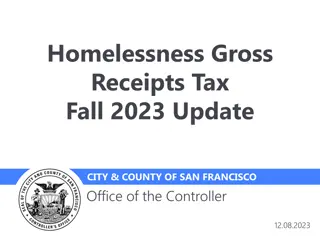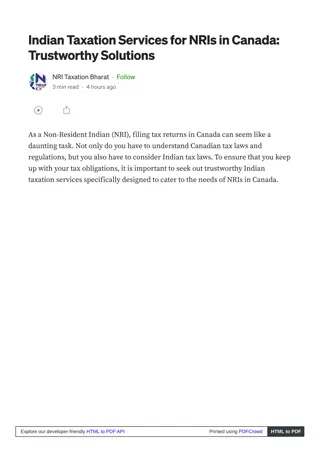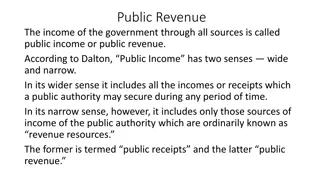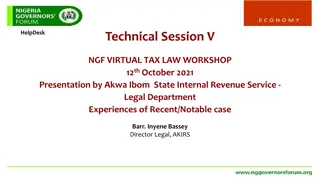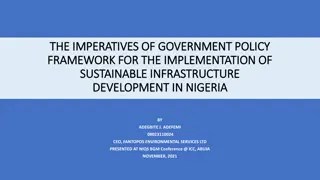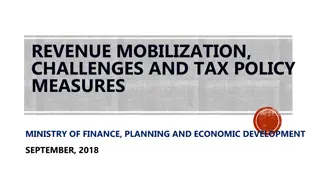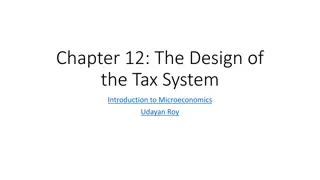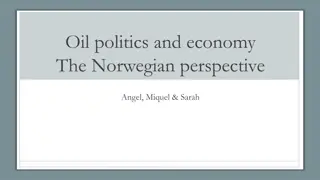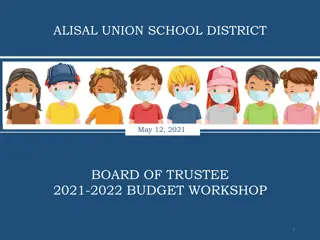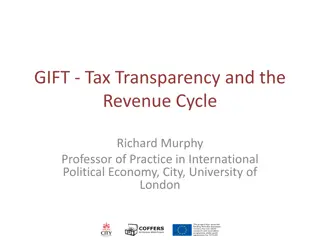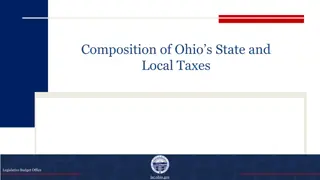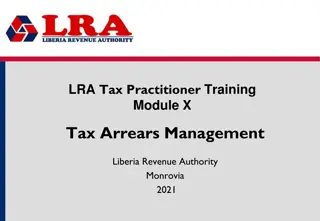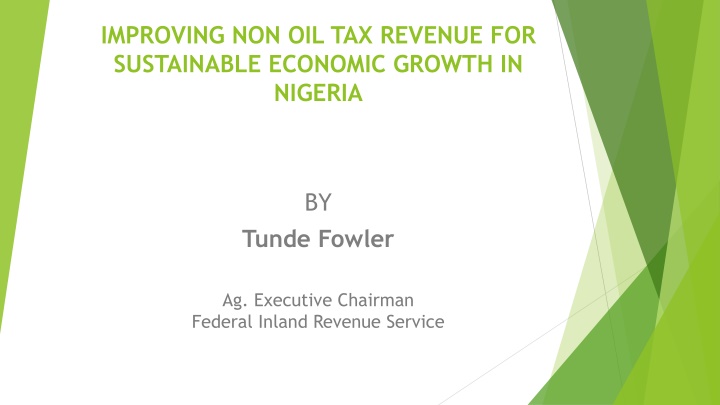
Enhancing Non-Oil Tax Revenue for Economic Growth in Nigeria
Learn how the Federal Inland Revenue Service in Nigeria is diversifying tax revenue sources from oil to sustainably grow the economy. Initiatives involve collaboration, widening the tax net, transparency in administration, compliance, and debt recovery to reduce dependency on oil revenues.
Download Presentation

Please find below an Image/Link to download the presentation.
The content on the website is provided AS IS for your information and personal use only. It may not be sold, licensed, or shared on other websites without obtaining consent from the author. If you encounter any issues during the download, it is possible that the publisher has removed the file from their server.
You are allowed to download the files provided on this website for personal or commercial use, subject to the condition that they are used lawfully. All files are the property of their respective owners.
The content on the website is provided AS IS for your information and personal use only. It may not be sold, licensed, or shared on other websites without obtaining consent from the author.
E N D
Presentation Transcript
IMPROVING NON OIL TAX REVENUE FOR SUSTAINABLE ECONOMIC GROWTH IN NIGERIA BY Tunde Fowler Ag. Executive Chairman Federal Inland Revenue Service
Presentation Outline Background Improving Non-oil Revenue How The FIRS Is Increasing Non-oil Revenue To Sustainably Grow Nigeria s Economy 1. Strengthening collaboration between FIRS; States Board of Inland Revenue and other stakeholders 2. Widening the tax net 3. Improving transparency in tax administration 4. Strengthening Compliance 5. Improving tax debt recovery Conclusions
Improving Non-oil Revenue How the FIRS is increasing non-oil revenue to sustainably grow Nigeria s economy Over the years, oil revenue (Petroleum Profits Tax) has been a major contributor to tax collection by the Federal Inland Revenue Service (FIRS). Given the unstable nature of oil revenues globally, FIRS has in the last decade noted the need to diversify sources of tax collection in favour of non-oil taxes. Consequently, several initiatives have been put in place to actualize this policy. An analysis of tax revenue collection over the last four years (as illustrated in the table below), will show that the quantum and percentage contribution of oil revenue to total collection has dropped. For example in 2011, oil taxes contributed N3 trillion representing over 66% of a total collection of N4.6 trillion. Oil revenue has always been a major contributor to tax collection, it is clear that its contribution may continue to decline as long as oil prices remain low. This presentation therefore examines in brief, how FIRS is combating dwindling oil revenues and the various efforts and initiatives to sustainably grow Nigeria s economy through efficient tax collection.
Improving Non-oil Revenue How the FIRS is increasing non-oil revenue to sustainably grow Nigeria s economy Year Tax Type Total % Oil % Non-Oil Oil Non-Oil 2011 3,070.6 1,557.6 4,628.2 66.3 33.65 2012 3,201.3 1,806.3 5,007.6 63.9 36.07 2013 2,666.4 2,139.3 4,805.6 55.5 44.52 2014 2,453.95 2,260.6 4,714.6 52.1 47.95 2015 (To August) 1,023 1,927 2,700.1 33.74 66.25
1. Strengthening collaboration between FIRS and States Board of Inland Revenue. FIRS met with the State Boards of Internal Revenue on 14th September, 2015 under the umbrella of the Joint Tax Board Issues discussed include modalities for improved collaboration through joint audits, exchange of information and deployment of technology to ensure that all taxpayers in the country, are identified, registered and begin to discharge their tax obligations. Over 33,000 corporate organisations and 20,000 individuals have been added to the tax net in less than a month of the exercise This collaboration will ensure that no State is left behind and that the generally low level of tax compliance in the country improves so that Government at all tiers will realise higher revenues from taxes and depend less on federal allocations. Not less than 29 state Internal Revenue Service have exchanged their data with FIRS for effective monitoring
2. Widening the tax net A major part of the collaboration with States is the focus on bringing all taxpayers into the tax net. Currently a large number of taxpayers (both individual and corporate) are either not registered with any tax authority or where they carry out business in more than one location, are not registered with the tax authorities in all the locations. Drive is therefore ongoing to ensure that all taxpayers are registered and discharge their obligations to the tax authorities in every jurisdiction where they are present. The focus is to remove all impediments to voluntary compliance and this we have demonstrated by encouraging taxpayers to make payment of their taxes which are due, whether they have a Tax Identification Number (TIN) and Value Added Tax (VAT) Registration or not.
Widening the tax net contd Engaging the taxpayers in their environment Recently launched a nationwide tax drive by going out into the field to meet the taxpayers in their own locations or places of business to get them to register and file appropriate returns. The target is to bring in a minimum of an additional 5,000,000 individuals and 500,000 corporate taxpayers, nationwide into the next. Accelerating registration The challenge of securing external data being resolved by integrating our platforms with agencies such as the Nigeria Customs Service, Corporate Affairs Commission and the Central Bank of Nigeria. FIRS is collaborating with financial institutions to increase data accessibility.
Widening the tax net contd Simplification of the registration and payment process Redesigned the TIN Registration Form to make it more user friendly and convenient for the taxpayer to complete. Introduced multiple payment channels such as Remita, e-tax pay, pay-direct etc to enable taxpayers effect tax payments from the comfort of their homes or offices. Increasing registration channels by creating Taxpayer Service outlets and interactive self-service stations. FIRS intends to increase the number of new channels such as mobile offices in markets, remote regions and outbound call centres. We also intend to design mobile applications that can be used on phones and other mobile devices.
Widening the tax base contd Enforce key taxpayer touch points We are leveraging on technology to improve tax collection, for example we will soon require companies to link their TINs to transaction with their banks, government agencies and other third parties to aid tracking of payments and taxes due on such payments. Taxpayer Education/Enlightenment by embarking on a nationwide communications campaign to educate the public on the need to pay taxes, the processes involved in payment of taxes, the benefits of tax payment and sanctions for non-compliance with tax obligations. The campaign will encompass traditional media, (Radio/TV campaign and Billboards) and also new media, such as internet blogs, social media sites and other channels that can reach a wide audience
3. Improve transparency in tax administration One other important tool in improving tax collection is improving transparency of tax administration. We are leveraging on technology to deliver on our mandate (ITAS, etc). The direct interface with the tax paying populace is minimised. ( Filing and payments are now possible online).
4.Strengthen Compliance Various initiatives are being implemented to strengthen compliance. These include: Strict implementation of tax laws by carrying out a review of tax laws to ensure that all provisions of the tax laws are fully understood Implement the salient provisions of tax laws the section on interim dividends recently implemented the provisions of the Companies Income Tax Act on payment of taxes on distribution of interim dividends. The implementation of this provision has led to assessments and payments in excess of N100bn in just one month. Other laws such as the Stamp Duties Act and the Capital Gains Tax Act are being reviewed to identify similar provisions that are not being implemented. Strict implementation of tax regulations FIRS is focusing on the implementation of regulations on Self-Assessment, Transfer Pricing and other key tax regulations that will positively impact revenue collection and decrease the incidence of tax avoidance and evasion. Collaboration with other stakeholders FIRS is improving collaboration with tax consultants, audit firms and organizations such as Chartered Institute of Taxation of Nigeria (CITN), Manufacturers Association of Nigeria (MAN), Nigeria Employers Consultative Association (NECA) and others to reach out to taxpayers so they understand the nexus between themselves and the tax authorities.
5. Improve tax debt recovery This is focused on reducing and ultimately eliminating tax debts owed by corporate entities, individuals and MDAs. Enhanced Audit/Investigation The Special Audit and Investigation function has been reorganized and now reports directly to the Executive Chairman. Improve on the turn-around time, efficiency and tax yield from tax audits and investigations. The audit teams will deploy risk based auditing, case selection and other tools in identifying defaulters and recovering unpaid taxes. Commenced nationwide withholding tax (WHT) and VAT audits to ensure that all taxes owed are paid. Strengthen Enforcement As a last resort, FIRS will deploy its powers under the tax laws to sanction and punish recalcitrant defaulters. These powers include powers to distraint, substitution and ultimately prosecution.
Conclusion Expectations are more than ever on FIRS and IRSs to provide the government needed revenue to finance her budget and meet the promises made to the electorates. The itemised strategies which include expanding tax net, making paying taxes easier, making it more difficult to evade taxes and making evasion/avoidance unfashionable by instruments of enforcement will enhance revenue collection The task before FIRS as well as IRSs is to put in place sustainable mechanisms that will insulate tax collection from the vagaries of oil price fluctuations. Our ultimate aim is to ensure that non-oil revenue becomes the major source of revenue for Government, while oil revenue serves as a back-up FIRS will also continue to seek for collaboration and cooperation of all stakeholders to ensure that everyone discharges his obligation towards improving tax collection and bringing sustainable change to Nigeria through effective and efficient tax system. 13

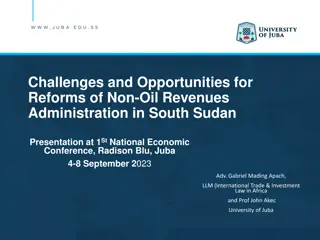
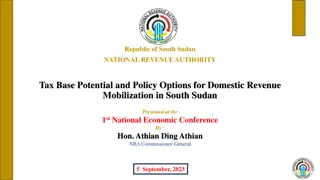
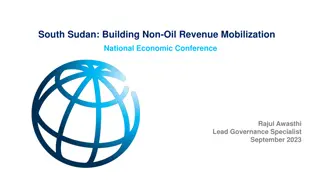
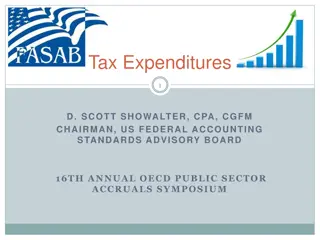
![Town of [Town Name] Real Estate Tax Rates and FY 2024 Budget Summary](/thumb/62211/town-of-town-name-real-estate-tax-rates-and-fy-2024-budget-summary.jpg)
